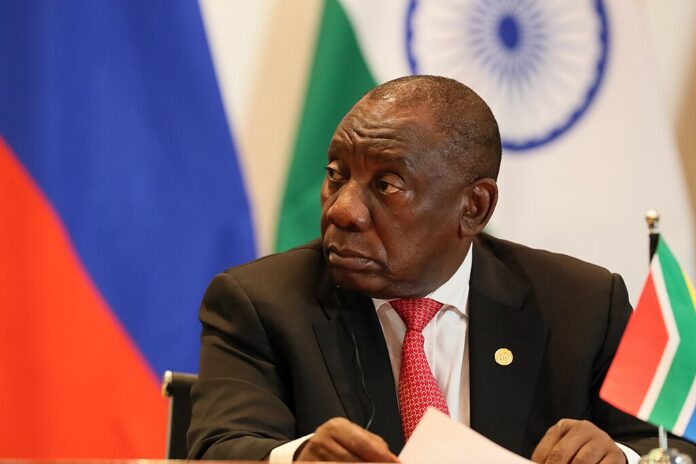President Cyril Ramaphosa calls for a shift in behaviour among ANC members, stressing the need for self-discipline and renewed commitment to serving the public
President Cyril Ramaphosa delivered a pointed message to ANC members on the final day of the ANC NEC Lekgotla, held at the Birchwood Hotel in Boksburg, Ekurhuleni. Addressing party members and public officials, Ramaphosa emphasized the need to avoid showcasing opulent lifestyles, a behaviour he warned could alienate them from the very people they are meant to serve.
Ramaphosa’s remarks came amid growing public dissatisfaction with the ANC, driven by perceptions of corruption and elitism. He underscored that the ANC’s efforts to renew itself and regain political dominance would falter if its members continued to appear detached from ordinary citizens. The President urged members to embody the principles of the ANC and to reflect these values in their everyday conduct.
Embed from Getty Images“The renewal of the ANC must be visible in our behaviour, on how we conduct ourselves publicly and on social media,” Ramaphosa said. “We must not be in the headlines for the wrong reasons. We need to be recognized for our excellence and competence, not for extravagance.”
The Lekgotla, a three-day strategic meeting, focused on addressing various social issues facing South Africa. Ramaphosa took the opportunity to address the high cost of living, proposing a review of pricing mechanisms for basic goods and services such as fuel and electricity. He also suggested expanding the list of VAT-exempt items to ease the financial burden on South Africans.
“Many people are struggling with high living costs due to transportation and other expenses,” Ramaphosa stated. “We need to explore ways to reduce these costs and make basic necessities more affordable.”
The President’s comments come at a time when the ANC faces significant scrutiny over its governance record. Public criticism has increasingly centred on perceived priorities of personal enrichment over public service. Ramaphosa’s address was aimed at countering these criticisms by reinforcing the need for humility and dedication among ANC members.
The Lekgotla concluded with Ramaphosa calling on all party members to be effective communicators of the ANC’s values and to conduct themselves with integrity. He urged them to contribute positively to the Government of National Unity (GNU) and to ensure their actions align with the party’s commitments to serving the public.
Analysis
Political: Ramaphosa’s call for ANC members to curb their lavish lifestyles and focus on public service highlights the ongoing challenges the party faces as it struggles to regain political favour. The ANC has been grappling with a crisis of credibility, driven by allegations of corruption and mismanagement. By emphasizing the need for a renewed focus on public service and personal integrity, Ramaphosa seeks to address these issues head-on. His remarks are a strategic move to reposition the ANC as a party of the people, capable of addressing public concerns and restoring trust.
The President’s emphasis on the importance of competence and accountability also reflects broader political pressures as South Africa approaches upcoming elections. The ANC’s ability to present itself as a party committed to reform and effective governance will be crucial in securing voter support. Ramaphosa’s message is therefore both a response to internal party concerns and a strategic effort to enhance the ANC’s electoral prospects.
Social: Ramaphosa’s address mirrors growing societal debates about wealth inequality and the role of public officials. South Africa, like many other countries, is experiencing heightened scrutiny of leaders’ lifestyles, particularly in the context of widespread economic challenges faced by ordinary citizens. The President’s call for ANC members to avoid flaunting their wealth aligns with broader societal expectations for public officials to demonstrate empathy and responsibility.
The focus on public service and ethical behaviour resonates with public calls for greater transparency and accountability from political leaders. By urging ANC members to reflect the party’s values in their personal and public lives, Ramaphosa addresses these societal concerns and attempts to rebuild the party’s image as one that genuinely serves the interests of the people.
Racial: Ramaphosa’s comments indirectly touch on issues of racial inequality in South Africa. The country’s complex history of apartheid and ongoing economic disparities have shaped public expectations of political leaders, particularly those from historically marginalized communities. The President’s emphasis on humility and service reflects a broader desire to address these inequalities and promote social justice.
By calling for ANC members to align their actions with the party’s values, Ramaphosa aims to address criticisms that the party’s leadership, particularly those from previously disadvantaged backgrounds, may be contributing to or benefiting from racial and economic inequalities. His message seeks to ensure that the ANC’s leadership is seen as working to rectify these issues rather than perpetuating them.
Gender: While Ramaphosa’s address did not explicitly focus on gender issues, the call for ethical behaviour and service impacts all members of the ANC, including women. Female leaders within the party may face additional scrutiny regarding their conduct and the perception of their priorities. Ramaphosa’s emphasis on discipline and public service reinforces the need for all ANC members, regardless of gender, to adhere to high standards of integrity.
Addressing gender dynamics within the party is essential for fostering a more inclusive and equitable environment. By setting a standard for ethical behaviour, Ramaphosa’s remarks contribute to creating a political culture where all members, including women, are expected to uphold values of service and responsibility.
Economic: Ramaphosa’s proposal to review the pricing mechanisms for basic needs and expand VAT exemptions addresses critical economic issues affecting many South Africans. The high cost of living, driven by factors such as fuel and electricity prices, places a significant burden on households. By advocating for measures to alleviate these costs, Ramaphosa aims to address economic disparities and improve living standards.
The President’s focus on economic reforms aligns with public demands for more effective economic policies and support for vulnerable populations. His proposals reflect an understanding of the economic pressures faced by ordinary citizens and a commitment to implementing practical solutions to alleviate these challenges.
